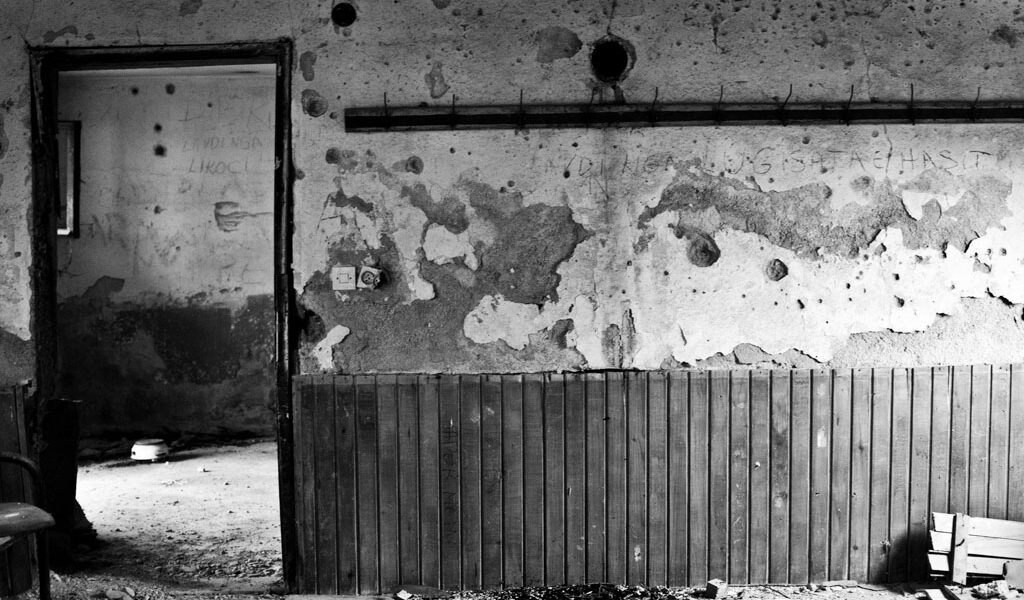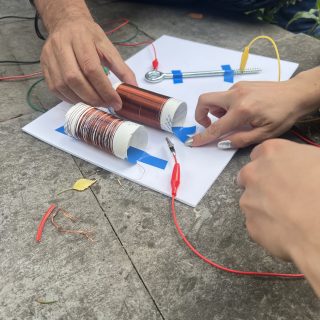Stories of women survivors of torture during the last war in Kosovo (10/10)
My sister, sister-in-law, cousins and I
About 17 women were assembled by a group of paramilitaries in a city in Kosova. The most beautiful women from the neighborhood were assembled, according to the witness. They were sent to a school in a nearby village. According to the testimony, there were tens of women held for days in a row. They were subjected to sexual, physical and psychological assault.
First Person Narration: They Put Us in a School Where Many Women Had Been Assembled
Viki
We were ten members in our family, my father and mother, five sisters, and three brothers. I was the youngest. We had a normal life. Our father really took good care of us. He was wealthy enough, kept us well fed and dressed, we’d buy whatever we liked. I remember I had a pink bicycle, he had bought to me as a birthday gift. I might have been five or six. So there are good things I recall from my childhood.
I was a very good student all the way to the high school. But I could not continue my high school. The University was too far. So my father had me engage and marry. I got engaged but did not see my fiancée until six months later. We got married. The first months were OK, and then he started to be very jealous. He was extremely jealous and drank a lot. I gave birth to three children. Then the war broke out. We were at home when we heard the noises. We were terrified, as we didn’t know what was going on. My husband and children all got to the ground. I had no idea what was going on. I thought someone was getting married and celebrating in their wedding, but the shooting just would not stop and was heard really close. We went to a neighbor’s and spent there some four days. They had a cellar where they could fit us too, the entire neighborhood went to their place. During those days I was left without any dippers. I had to go home and get some sheets or something. It was not far. I was dressed in training clothes, and they must have thought I was a man and they started to shoot at me from a hill. The snipers would shoot the minute they’d see someone move. But I went home and got the sheets.
There were no movements. They said to us, “Go wherever you want. There is no place for you here anymore.” They would knock on the doors and tell all the residents to get out. We were moving on a bus and the police would enter so often to see who is inside, if there are any suspicions faces. We traveled for four hours. My mom had come out to wait for me. Then we were trying to think where we could go from there. The phone lines were off; you could not call anyone.
So we set off. We calmed down a bit. At my sisters’ house they had entered, they had killed her husband and daughter and they were coming our way. Then they came and took me, filled up their trucks, choosing the young and healthy women. We had no idea where they were taking us. They had taken 17 women in total in that truck. We didn’t know what was going to happen to us. When we stopped, they had come to a large school. There we saw a lot of other women, they were all torn and beaten, and looked miserable. They made us enter. They were pushing us as much as they could. We entered inside, there was one woman only there. “Where are we? What will they do?” She told us. “Dear God, poor you women”, she cried. She was asking “So they took you like they did us? Whoever gets on their hands, will not come out sane.” They pulled our teeth with pliers, because we were refusing to do what they ordered. You see this scar here? They cut my leg, and the genitals too. They extinguished cigarette buds on our arms and cut us with knives. They kept us there for three days and three nights.
They would open our mouths forcefully and made us swallow their raki [local strong spirit, t.n.]. They tortured us, beat us up, they cut our belly, genitals, the front, the back (sighs). After three days they loaded us on trucks again, and they were saying “We are taking you to Serbia because Arkan is asking for you.” When we had travelled for some time, my sister had managed to untie herself and helped us untie too. She broke a bottle she found inside, untied us, she helped us untie. Then we helped our sister-in-law untie. And then we helped the other women, and some were saying they were fearing. Then we jumped from the truck as we were there. We walked until we came to a man with a carriage pulled by horses. “What has happened to you like this?” he asked us. Half of us that were in the truck have jumped, I don’t know whether the other half have jumped or not. The women there were indeed all beautiful, the ones they wanted to take to Arkan. So the man asked “What happened to you? Where are you trying to go?” My sister said, “We have been running through woods and got scratched on bushes.” He asked where we wanted to go. He was a Roma man. He offered us a ride. We got on his carriage and got on the way, but we were trying to cover and hide, fearing that the truck might come back.
When we went home at our mother’s, my brother saw his wife and learned what had happened. He was furious “I will leave her; I will not keep her any longer.” My husband came to and said “You’re not my wife from this day on.” My mother said, “What can we do? There is nothing I can do!” My mother and brother were discussing. My brother was troubled. She said, “Look at your own sisters my son. What happened to your wife is the same to what happened to your sisters. Will you forget your sisters? Abandon tour sisters? And your wife? Where do you want to leave the kids?” He stopped. He didn’t speak any more; he kept to himself. They rapped my mother too the day they entered. And they took us with them. They also beat up our mother as she did not want to let them take us. They beat her and beat her. They cut her with a knife, she still has a scar on her leg. She was determined to not let them take us. She quarreled with them hard enough, but at some point they threw her on the ground (sighs). When we came back home, our mother awaited us happily. Then the other harassments came. They wanted us to leave the house and join a row of people leaving. It was April 9 when they made us get out of the house. The suffering we experienced is impossible to describe. We tried to mask our faces with dippers and keep our head low, but all in vain. Three times on our way we were raped by the policemen. I don’t know if they were paramilitaries or what. They had drawings on their faces. You could not tell who they were or what they were. They used some nicknames, not their real names. They usually had very short nicknames. Nicknames like Fish, or Lion, the other was Wolf, namely the one who eats you like a sheep. My dear God, how much we suffered from that guy called Wolf, may God pay him all back. Together with his family. They tore us apart. They literally did. They raped us until we were torn. They raped us on the way. The whole world knows it. There was so much raping going on. We walked for five days one way, then walked to return, with little children, rapes, bloodshed… horrible it was. They would swear at us and yell at us. “How dare you oppose us?” they’d say. The girls had been lost. They had gone and sheltered at my mother’s. When they kicked us out of there… “What is it?” ”Mom, what happened to you?” “Nothing!”, I said. She said, “No, we have seen it.” They know it but never mention it to me. They have accepted that that is what has happened. Every April I recall what has happened, and get so upset, I need to go to hospital.
They would collect them from every neighborhood, assembled them at the mosque. There is that spot near the mosque. all those men, all those women, all those old people shot. When we returned, then they collected the men. They collected them and put them in prison. They were saying it was going to be very bad.
Someone gave us two loafs of bread. The regular army would give us some food.
The Serbian soldiers, they were not causing any trouble. They didn’t want to sin by touching women and children. They gave us powder milk, they gave us bread, and gave us some sort of (sighs)… it was in a tube. The regular army I mean. Those that were in tents, they stopped us on the street and raped us. It happened for three days. It was raining hard. My brother had a daughter in his arms. And a soldier goes to him “Stop!” He asked him to stop, but not us. He stopped, but my sister and his wife also stopped and I was more on the side with my mother. He pulls his knife and wants to slaughter my brother. But he had cut his star from the hat and used it to stitch it on a plastic sheet for my niece, so that she doesn’t get wet from the rain. It was raining. God was crying from what was happening to us (sighs). The children would get tired and sleep. Some were walking with hands in their pockets. I couldn’t let go of my daughter. I had to carry her.
We had injuries caused by cigarette buds and knives. These you could attend to as they were on the outside, but the wounds inside were worse.
After NATO started to bomb, an Albanian doctor was coming to treat us. That was after NATO started to bomb them properly.
They gave us the first aid, they stitched us, helped us with some creams to heal the anus. They gave us some pills for the traumas, because we told them what had happened. They took our names and details. That doctor came to check on us every week and he was putting his own life in a jeopardy, as he had to travel from another city. He was the only one to attend to victims of war. Someone else would not do it.
My sister was also in a terrible state. She did not want to separate from her husband and daughters. The doctor asked me, “Are you going?” He encouraged me to take my daughters and leave, promising I would get better. I took my daughters, he told me where to go and how, and later made sure I went to Belgium for a medical treatment. A Belgian woman married to an Albanian guy was the sponsor.
She would come to visit me in the hospital. She was my translator, such a nice woman. She will be my sister in this world and the next. They kept me for 28 days with transfusions. Non-stop. They would just change the bottle. And after I got better and was ready to leave the hospital, she said, “I will take you to the camp and register you as a refugee.” We went there and reported, and she said, “I want to take you to the highest floor, and bring the food to you upstairs, so that others do not see you and you can only come down when and if you chose.” I would agree to all of her suggestions. I was constantly thinking about my other brother, the second one. The police had taken him, and the papers were saying that he was dead. But he had not been killed. They had taken him to the prison, harassed him, beaten him up, even raped him. Then they had released him and made him go to Albania. I had no contact with him. The phone lines were not working. My mother always had a phone. I tried and tried, and after having spent six months in Belgium, I finally got to talk to her. “Mom, are you all alive and well?” I asked. “We’re all alive, but your brother is sick, he may die.” “Why?” I asked. She said that they had beaten him up badly and raped him. I said to her that I would go back. In Belgium I met a family, and they said that they wanted to make sure I get some sort of support from them as a compensation for all my suffering. They were very helpful. “You are left with three children and no roof over your head. Tell us where you want the new house and we will pay for it.”
I wanted to go to my mother’s. I don’t like that city any more, not after the rape and all. I cannot love it any more. And when I went to my mother’s, the trauma was back, because of the terrible memories from there.
I went back.
My sisters, cousins from my mother’s and father’s side, we were all together. But let everyone speak of herself, because it is not my right to speak about the others. I can speak about myself, and my sisters. My sister was running after her husband, because he had been taken away. She had her two sons. Her husband is the only brother of six sisters. My sister was caught from the policemen, taken to a police station and then raped by them.
The policeman had asked her, “How does a woman run after her husband?” The Albanian women were always praised for their high morale. While raping us they were saying, “You Albanian women deserve worse because you try to protect your honor.” They swore at us, threatened us. “We will do this and that to you, and then burn you alive.” After what they have done to us, no Serb deserves to have their name even mentioned in Kosova.
I don’t know how some people go to Montenegro for holidays. “Where are you going?” “To Montenegro!” “And what about the atrocities they committed against us?” There were more Montenegrins than Serbs.
I tried to kill myself several times after I returned to Kosova. Because we would speak and tell about the experiences of other people, and that would haunt me. I would look at my daughters and think, “Who will take care of them?” They don’t have a father, and without a mother, where will they be? I would put the rope and make ready the chair and all, but they’d find me and prevent me. My oldest daughter caught me twice swallowing pills without counting them. She had reacted swiftly.
My husband came three years after I returned to Kosova. And he pushed me and threw me on the bed in front of our daughters. He raped me. “Is it good to be raped by the paramilitaries?”
That is also rape, because I had not seen him for three years. “Do you like it? Does it feel good?” Is it this, is it that, he yelled. The girls were screaming and crying. I was screaming and crying myself. I signed to them with my hand to go find help. They went and called the neighbor and he pulled him away, detaching him from me. It was a good thing I did not get pregnant, because I don’t know what I’d do. I was traumatized. Went to the hospital. I spent there eight weeks. Neurosurgery. They did some analysis and said I was very sick. As if the traumas of the war were not enough, I had to experience this one too. Two months later they check me up and say, “You are pregnant”. “Pregnant?” I said I wanted to abort the child. I went to abort. The doctor said, “I can’t. You are anemic. Low in red blood cells.” I still did abort.
My message would be for women to speak up, so that their voice can be heard. If we don’t speak up, nobody is going to ask about us. Without us telling our stories, nobody will know what happened to us. Let the society in general help us out, let them not demean us, point fingers at us, call us names. Let them say some words of support. Let them support us the best way they can.
This story is part of "I want to be heard: Memory book with stories of women survivors of torture during the last war in Kosovo", powered by forumZFD and Integra in collaboration with KRCT – The Kosova Rehabilitation Centre for Torture Victims, and supported by German Federal Ministry for Cooperation and Economic Development, Rockefeller Brothers Fund, Charles Stewart Mott Foundation and UN Women.



